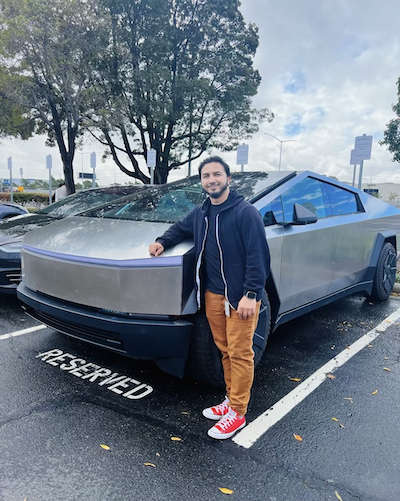
Fresno, California Oct 13, 2025 (Issuewire.com) - The future of advanced manufacturing isn't just about faster robots or more powerful AI; it's being built on a foundation of digital resilience. This year, the international technology community turned its focus to Omkar Bhalekar, a Senior Network Engineer at Tesla, whose recent honor underscores a pivotal transformation in how we approach industrial infrastructure. At the 5th International Conference on Computing and Communication Networks (ICCCNet-2025) hosted by Manchester Metropolitan University, in Manchester, UK, Bhalekar was presented with the 2025 Distinguished Award for Infrastructure Resiliency, a recognition that celebrates not just his individual achievements but a revolutionary new doctrine for building the factories of tomorrow.
Redefining Industrial Network Architecture
Traditional manufacturing networks were designed for predictability and isolation. Omkar Bhalekar's approach dismantles this paradigm by introducing data center networking principles into factory environments, a strategy that initially seemed counterintuitive but has proven transformative.
The integration of non-traditional networking technologies into Tesla's production lines represents a bold departure from industry standards. While competitors maintain rigid separation between IT and operational technology, Tesla's infrastructure enables seamless data flow between production systems, quality control mechanisms, and predictive maintenance algorithms.
This architectural philosophy extends beyond mere connectivity. By treating factory networks as dynamic, software-defined environments rather than static industrial systems, Tesla has achieved unprecedented levels of operational visibility and control.
The Economics of Network Resilience
Critics often dismiss infrastructure investments as necessary evils, costs that must be minimized rather than strategic advantages to be maximized. Bhalekar's work at Tesla demonstrates the fallacy of this thinking through measurable economic impact.
The automation of over 4,000 networked SuperChargers under Bhalekar's leadership exemplifies this principle. By deploying AI-driven orchestration across Tesla's charging infrastructure, the company achieved $20 million in annual operational cost reductions while simultaneously improving service reliability.
More On Netglobalnews ::
- Harsha Saxena, IICSR Group: INZS 2026 Catalyses India’s Net Zero Transition
- Exploring Vithy’s China Top Candle Filter at the China International Chemical Technology - Equipment Fair
- Elliot Ambalo Isn’t Guessing: He’s Using Data to Predict What Your Brand Needs Next
- Atua AI Deploys Smart Workflow Systems to Streamline Developer Productivity
- A Bold Journey of Healing and Self-Discovery Unfolds in “Nobunoni Book of Shadows” by Tata Nganga Nobunoni
These savings emerge not from traditional cost-cutting measures but from intelligent resource allocation enabled by resilient network design. When networks can adapt to changing demands in real-time, organizations can optimize energy consumption, reduce maintenance cycles, and eliminate redundant processes.
Manufacturing Meets Machine Learning
The convergence of manufacturing and artificial intelligence requires infrastructure capable of processing massive data volumes while maintaining microsecond-level responsiveness. Tesla's approach, refined through Bhalekar's engineering expertise, treats network resilience as an enabler of machine learning rather than a separate concern.
This integration allows production systems to learn from historical performance data, predict potential failures before they occur, and automatically adjust operational parameters to maintain optimal efficiency. The result is a manufacturing environment that becomes more intelligent over time rather than simply more automated.
The implications extend beyond individual production lines. When manufacturing networks can share insights across facilities, companies gain the ability to optimize global operations based on local learning, a capability that traditional industrial networks cannot support.
Academic Recognition and Industry Validation
The Distinguished Award for Infrastructure Resiliency, presented by Manchester Metropolitan University's ICCCNet-2025 conference, carries significance beyond ceremonial recognition. The conference's rigorous standards and publication through Springer's LNNS series represent academic validation of practical engineering excellence.
This recognition reflects a growing understanding that infrastructure resilience is not merely a technical requirement but a strategic discipline worthy of scholarly attention. As manufacturing becomes increasingly dependent on digital systems, the academic community recognizes the need for research that bridges theoretical networking concepts with real-world production challenges.
Omkar Bhalekar's presentations at international conferences, including IEEE PSETC in Singapore and INCST in Bangalore, demonstrate the global relevance of his networking innovations. These contributions help establish new standards for industrial network design that other manufacturers are beginning to adopt.
The Future of Industrial Infrastructure
The success of Tesla's network-centric manufacturing approach raises important questions about the future of industrial infrastructure. As electric vehicle production scales globally and renewable energy systems require increasingly sophisticated coordination, the networking principles pioneered at Tesla become essential rather than optional.
Organizations that continue to treat network infrastructure as a utility rather than a strategic asset will find themselves at a growing disadvantage. The ability to adapt quickly to market changes, optimize resource utilization, and maintain operational continuity during disruptions increasingly depends on network resilience.
Omkar Bhalekar's recognition at ICCCNet-2025 validates this perspective and provides a roadmap for other organizations seeking to modernize their manufacturing capabilities. The award acknowledges not just technical excellence but the strategic vision required to transform industrial networking from a support function into a competitive advantage.
Beyond Recognition: Building Tomorrow's Infrastructure
The 2025 Distinguished Award for Infrastructure Resiliency represents more than past achievement, it establishes a benchmark for future innovation. As industries worldwide grapple with digital transformation, the networking principles demonstrated at Tesla provide a proven framework for success.
The challenge for manufacturing leaders is not whether to adopt these approaches but how quickly they can implement them. Companies that delay infrastructure modernization risk falling permanently behind competitors who understand that network resilience enables rather than constrains innovation.
Omkar Bhalekar's recognition at ICCCNet-2025 celebrates individual excellence while highlighting a fundamental truth: in our interconnected world, infrastructure resilience is innovation resilience. Organizations that embrace this reality will define the future of manufacturing, while those that don't will struggle to keep pace.
The award ceremony in Manchester marked not just the end of a successful conference but the beginning of a new era in industrial networking, one where resilience and innovation are inseparable, and where the networks we build today will determine the manufacturing capabilities of tomorrow.
To learn more visit: https://www.omkarbhalekar.com/
Author Jessica Smith
Source :Omkar Bhaleker
This article was originally published by IssueWire. Read the original article here.